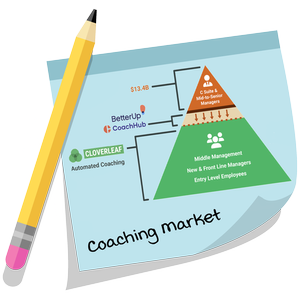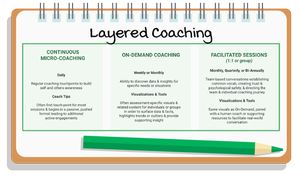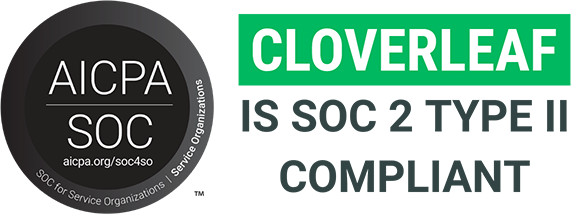Finding satisfaction in your career has become harder with the changing work landscape and a constant buzz of social media notifications. Companies are moving towards initiatives that include new and foreign hour structures, virtual meeting styles, digital workspaces, and more. For many, developing these new skills can be overwhelming.
Job coaching has come a long way from the days of fluorescent-lit rooms with slide screen presentations. Now, with new technologies and modern connectivity at our fingertips, learners have an opportunity to step out of those well-lit rooms and into a sunnier digital space of personalized, quality-driven, job coaching.
What is Job Coaching?

Job coaching comes in many forms and plays an important role in creating interconnected teams, improving employee communication and interpersonal skills, increasing work awareness, and understanding others’ needs alongside one’s own. From executive officers to new hires, there is a spot for everyone but not everyone has taken advantage of these new opportunities. Let’s go over some differences in coaching styles and see some ups and downs.
What is Executive Coaching?
Executive coaching or executive development is an agglomerate phrase and a well-known term covering several mentoring subcultures. From one-on-one mentoring to executive seminars, these coaching styles focus on educating the top of a traditional org chart to better position the business for success or help the CEO make better decisions. In a sense, it’s traditional coaching but there can be a variety of variations that tailor to the needs of the individual.
Despite the high profile, Executive coaching has ups and downs. It is a nebulous term that often encompasses wide-spanning terminology such as goal setting, personal development, and individual success. These terms are notoriously vague and many can see no improvement due to murky goal setting. Despite the terminology, Executive Coaching often leads to a highly focused coaching style that caters to the individual benefits of business leaders but at an often high price per session.
What is Coaching On Demand?
Coaching on demand is a version of executive coaching that is targeted to early and mid-career professionals. This type of coaching is typically booked online through an app or website. Most sessions are virtual, facilitated by a certified coach, and are offered at a steep discount compared to other types of executive coaching.
On-Demand coaching like this makes executive level coaching accessible to more people. A professional schedules an appointment at a time convenient for their schedule or for a specific challenge, and the two parties usually don’t develop a long-term coaching relationship. This type of executive coaching works well to help solve a specific career problem or crisis, but doesn’t allow for longer-term leadership development and progress.
What is Mid-Level Coaching?
This coaching style has been popular for a long time and has been the butt of plotlines and jokes across popular media for decades. With phrases like “Leadership Seminars” and “Success workshops” this coaching style widens its target demographics and focuses on the middle to upper-level management. From directors to the executive suite, mid-level coaching often takes place in groups and often follows the same ideas as executive coaching, but brings in a coach from outside the organization to offer help.
The goal of most mid-level coaching opportunities is to break down the boundaries that upper-level management places on themselves through work culture, stress, career style, and more. It is a calculated and coordinated second opinion that looks to improve decision-making, flexibility, and leadership skills.
These phrases and uses for Mid-Level coaches seem as vague as Executive Coaching, but it is far from it. The nebulousness of on-demand coaching comes from its large array of tools and uses. However, the cost typically associated with this type of leadership coaching is significant which makes it incredibly difficult to scale and does not offer the same impact that many get from executive coaching.

What is Micro-Coaching by Cloverleaf?
Cloverleaf’s coaching style finds its success in the digital nature of most modern businesses where new technologies combined with teamwork are the driver’s of a business’ success. Micro-coaching or continuous micro-coaching or Automated Coaching™ is the use of weekly, daily, hourly, or continual coaching in micro-doses. Think of it as small snippets of helpful information to optimize the day for success and increase the daily takeaway.
Micro-coaching, like a digital business, thrives on algorithms and data. Cloverleaf personalizes its professional development through personality tests like the Enneagram, DISC, Energy Rhythm surveys, Strengths Finder, and other metrics. These suggestions provide answers and integrate team-related content into its coaching sessions.
This small tweak to the traditional model of coaching offers new approaches for team collaboration and employee development. By providing team analysis, Cloverleaf can take the Enneagram and DISC of each member and plot them on charts to better visualize how each member learns, works, rests, and creates, allowing for a more agile and high-performing team.

HUMAN SKILL PROGRAMS ARE HITTING LIMITATIONS...
- Close the widening gap between learning and on-the-job application
- Overcome the tension of pausing productivity for development opportunities
- Integrate learning so it is actually in the flow of work
- The evolution of human skill development
- What Automated Coaching™ is and how it works.



